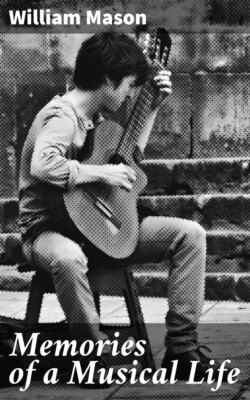Читать книгу Memories of a Musical Life - William Mason - Страница 4
На сайте Литреса книга снята с продажи.
EARLY DAYS IN NEW ENGLAND
ОглавлениеTable of Contents
I AM the third son of Lowell Mason of Medfield, Massachusetts, and of Abigail Gregory of Westborough, Massachusetts, his wife, and I was born in Boston on January 24, 1829. My father was in the seventh generation from Robert Mason, who was born in England about the year 1590. In 1630 Robert came to America, and was probably one of John Winthrop's company, landing at Salem on the twelfth day of June of that year. Thomas Mason, the elder son of Robert, went to Medfield to live in the second year of the settlement of the town. His marriage with Margery Partridge, on April 23, 1653, was the first marriage to be entered upon the town records; and the homestead lands, which he acquired by grant from the town, have ever since remained in possession of some member of the Mason family. Thomas and two of his sons were killed by the Indians under Monaco on February 21, 1676, when Medfield was burned. The line was continued through Ebenezer, a third son, born at Medfield, September 12, 1669; Thomas, a son of Ebenezer, born at Medfield, April 23, 1699; Barachias, son of Thomas, born at Medfield, June 10, 1723, who was musical and who taught singing; and Johnson, son of Barachias, born at Medfield, August 7, 1767. Johnson was the father of Lowell Mason, who was born at Medfield, January 8, 1792. On January 8, 1892, the one hundredth anniversary of my father's birth was celebrated at Medfield, under the auspices of the Historical Society of that place. In the address delivered by the president of the society, a period of his life was touched upon concerning which but little had heretofore been published. The address will be interesting to those who are interested in him and in the work which he accomplished, and is printed, by permission, in an appendix to these memories.
The difference between Boston and New York as musical centers is largely due to my father. He made Boston a self-developing musical city. New York has received its musical culture from abroad.
My father manifested a remarkable fondness for music at an early age. His parents did not intend that he should take up music as a profession, but his talent was not neglected. In 1812, before he was twenty, he heard of an opening in a bank in Savannah, Georgia, and having secured the position, he went there. After business hours he continued his studies in music with an instructor named F. L. Abel, under whom he made rapid progress. He soon attempted composition, his first efforts being hymn-tunes and anthems. He arranged a collection consisting of a group of selections from William Gardiner's "Sacred Melodies," to which he added some of his own compositions. For this collection he vainly endeavored to find a publisher in Philadelphia and Boston, until chance brought to Savannah a Boston organ-builder, W. M. Goodrich, who had come to set up an organ. He induced my father to go to Boston in person, with the result that the work was submitted to Dr. G. K. Jackson, the organist of the Handel and Haydn Society, and received his approval. It was published in 1822, with the title, "The Boston Handel and Haydn Society's Collection of Music," and was an instant success, finding its way into singing-schools and church choirs throughout New England. Some of my father's hymn-tunes have become famous. It has been said that his missionary hymn, "From Greenland's Icy Mountains," has been sung in more languages than any other sacred tune. Among the many popular tunes which he composed are "Boylston," "Hebron," "Olivet," and "Bethany"; and one of his collections of sacred melodies brought him in over a hundred thousand dollars in royalties.
